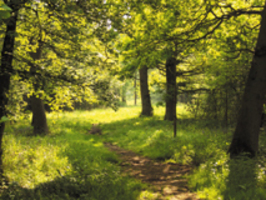THE definition of woodland in the United Kingdom forestry statistics is land under stands of trees with a canopy cover of at least 20 per cent (or having the potential to achieve this), including integral open space, and including felled areas that are awaiting restocking.
Urban Eden’s experts have cast their eyes over the stats and declare that, yes, Milton Keynes is – like Sherwood or Epping or New (which will now obviously have to change its name to Old) – officially a forest.
Although the list of tree species in British woodland is closely defined, it includes all the usual Milton Keynes species. Woodland includes native and non-native trees, semi-natural and plantation areas. Woodland habitat types are not currently differentiated in these statistics.
There is no minimum height for trees to form woodland at maturity so the definition includes woodland scrub but not areas of gorse or rhododendron, for example, outside woodland.
Virtually all the wooded green spaces managed by the Parks Trust, including Linford Wood (pictured), are already designated woodland, including the grid road reserves.
They used to, and may be still do, enjoy grant aid from the Forestry Commission and they are managed under an approved Plan of Operations which allows the Parks Trust to manage those areas responsibly without having to obtain felling licences from the Forestry Commission every time it has to do some thinning.
In 1997, the Parks Trust Estate was given the National Centre of Excellence Award by the Forestry Authority England – one of only four such awards granted between 1993 and 1997. This was in recognition of creating the widest possible range of uses, such as improving quality of landscape, creating benefits for wildlife, providing recreation, growing timber in an environmentally sound way: in short, multi-purpose forestry.
Bizarrely – and apparently because Milton Keynes won it – the award was then summarily discontinued, the alleged reason being that this did not sit comfortably with the up and coming government agendas for new build.
The more we look, the more we find…
For more information, visit www.urbaneden.org“


